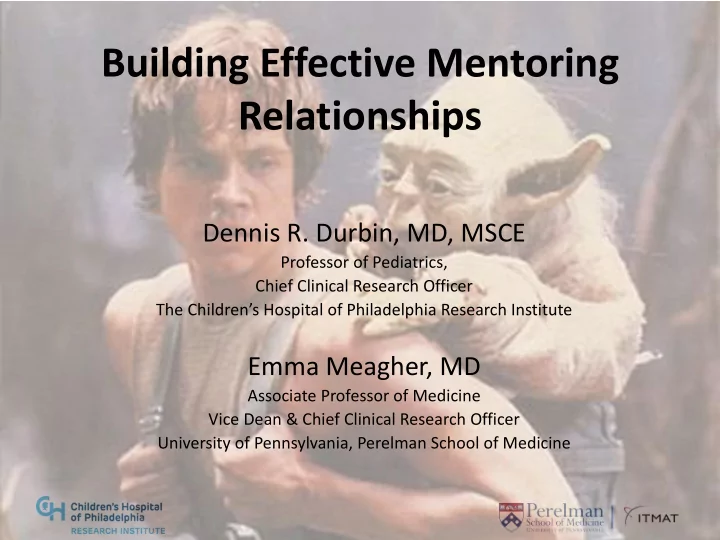

Building Effective Mentoring Relationships Dennis R. Durbin, MD, MSCE Professor of Pediatrics, Chief Clinical Research Officer The Children’s Hospital of Philadelphia Research Institute Emma Meagher, MD Associate Professor of Medicine Vice Dean & Chief Clinical Research Officer University of Pennsylvania, Perelman School of Medicine
Overview of Presentation • Define various roles in career development • Learn approaches to develop specific skills – Enhancing communications skills – Establishing and aligning expectations – Work/life integration • Identify resources to enhance your mentoring practice
What is Mentoring?
What is Mentoring? A dynamic reciprocal relationship in a work environment between an advanced career incumbent (mentor) and a less experienced professional (protégé) aimed at promoting the development and fulfillment of both . Healy CC. Educ Res 1990:19 17-21
What is Mentoring? Formal Informal Less Strategic More Strategic • Not tied to specific objectives • Tied to personal and organizational • Matches based on similarity/ objectives attraction • Specific success metrics • No defined timeline • Matches based on developmental goals • No training • Has defined timeline • May involve training
Who is involved in career development? • Complementary Roles in Career Development – Mentor • Focused on career development • Tension created by reliance on mentee – Department Chair/ Division Chief • Provides opportunities, resources • Has overall mission of a group in mind – Advisor • May be more “technical” in nature • Neutral third party focused solely on development of advisee – Collaborator/ Co-Investigator • Unique expertise to learn from • Focused on a work product or project
Assembling a Mentoring Team Mentee National Center for Faculty Development and Diversity: www.FacultyDiversity.org
Research Mentor Training Program Research Mentor Training Topics Enhancing Communications Aligning Expectations Assessing Understanding Equity & Inclusion Fostering Independence https://mentoringresources.ictr.wisc.edu/ Promoting Professional Development Evaluated in a 16-center RCT ( Acad Med 2014;89:774-772) Work/Life Integration
Enhancing Communications • Ineffective communications at the root of many mentoring problems • Must recognize your own communications style and that of your mentor • Adapt your style as needed to ensure most effective communications
Activity #1 Communication Style Inventory
Enhancing Communications http://www.whecare.com/images/form.pdf 5 10 7 8
Enhancing Communications • Likely validating for what you already know • May vary under different circumstances • Home • Work • Meant to raise awareness of your “go to” style • Provides language to discuss challenges with mentee
Research Mentor Training Program Research Mentor Training Topics Enhancing Communications Aligning Expectations Assessing Understanding Equity & Inclusion Fostering Independence Promoting Professional Development https://mentoringresources.ictr.wisc.edu/ Work/Life Integration
Aligning Expectations • Shared understanding of what both the mentor and mentee want from the relationship • Frequently not clearly stated or aligned at start of relationship • Who is “in charge” of career development?
Activity # 2 Alignment of Expectations
Aligning Expectations Early conversations • Topics to discuss – Short and long-term goals – Areas of interest – Communications styles – Meeting schedules – Timeline and milestones – Identifying others involved – Additional education/training needed – Professional networking – Developing a career development plan – Work/life integration
Research Mentor Training Program Research Mentor Training Topics Enhancing Communications Aligning Expectations Assessing Understanding Equity & Inclusion Fostering Independence Promoting Professional Development https://mentoringresources.ictr.wisc.edu/ Work/Life Integration
Work-life Integration • Goal – Provide structure/resources to raise and address work/life issues constructively between mentors and mentees
Not work/life “balance” but “integration” Current Situation Goal for the Future Work Family Family Work Community Self Self Community www.totalleadership.org
The Program BEGIN BE REAL BE WHOLE BE INNOVATIVE REFLECT & GROW Act with authenticity Act with integrity Act with creativity Be real : act with authenticity by clarifying what’s important Personal vision statement • Conduct a 4-way assessment • Be whole : act with integrity by respecting all your people Conduct stakeholder interviews • Be innovative : act with creativity by experimenting Design and conduct an experiment • Work in groups of 3 to provide coaching and support •
The four-way assessment Assess importance, focus, satisfaction and performance in each domain Satisfaction Performance Importance Focus 1=not at all …10=fully 1=poor …10=excellent Work / Career % % 1 2 3 4 5 6 7 8 9 10 1 2 3 4 5 6 7 8 9 10 Home / Family % % 1 2 3 4 5 6 7 8 9 10 1 2 3 4 5 6 7 8 9 10 Community / % % 1 2 3 4 5 6 7 8 9 10 1 2 3 4 5 6 7 8 9 10 Society Self: Mind, Body, % % 1 2 3 4 5 6 7 8 9 10 1 2 3 4 5 6 7 8 9 10 Spirit Overall 100 % 100 % 1 2 3 4 5 6 7 8 9 10 1 2 3 4 5 6 7 8 9 10
Activity # 3 Leadership – 4 Way Assessment
Experiments: Innovative actions to produce four-way wins • Concrete, implementable, important step toward vision • Impacts (directly or indirectly) all 4 domains • “Small wins” • Find new ways of creating mutual value among domains • Mutual coaching within small group to problem-solve, encourage and hold accountable
Results: (N>300) Importance (%) Attention (%) Δ Satisfaction Δ Performance (%) (%) Pre Post Pre Post Pre to Post Pre to Post Work / Career 34 32 56 44 21 8 Home / Family 34 34 23 28 27 14 Community / 12 14 7 11 31 11 Society Self: mind, 20 20 14 17 39 22 body, spirit What’s important But focus of time …as satisfaction …and doesn’t change and energy shifts increases in all performance much over four from Work to other domains, increases in all months. domains… especially Self... domains, too. www.totalleadership.org
Summary: Be more intentional! • Focus on role clarity • Be more structured – Regular standing meetings – Standing agenda controlled by mentee – Use tools/ discussion guides
Recommend
More recommend